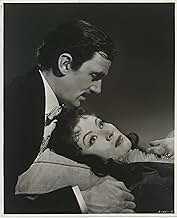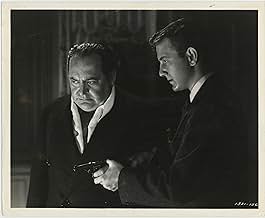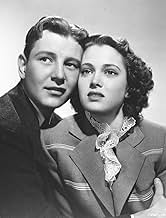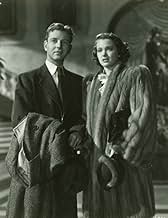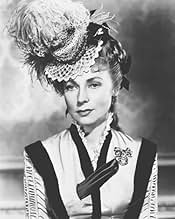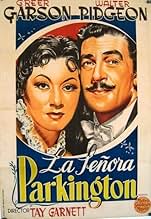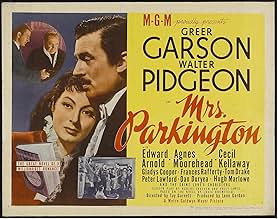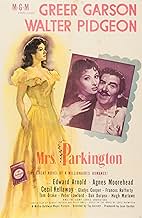CALIFICACIÓN DE IMDb
7.0/10
2 k
TU CALIFICACIÓN
Una matriarca viuda rememora la fortuna de su familia, incluido su romance con un financiero/propietario de una mina.Una matriarca viuda rememora la fortuna de su familia, incluido su romance con un financiero/propietario de una mina.Una matriarca viuda rememora la fortuna de su familia, incluido su romance con un financiero/propietario de una mina.
- Dirección
- Guionistas
- Elenco
- Nominado a 2 premios Óscar
- 4 premios ganados y 3 nominaciones en total
St. Luke's Episcopal Church Choristers
- Carolers
- (as Saint Luke's Choristers)
Opiniones destacadas
Oh, why couldn't this film have been longer? I was taken in from the very beginning and was fascinated watching the lives of the Parkingtons. Greer Garson was exceptional as we watched her age from a young lady to a family matriarch in her 80's. I must agree that the pairing of she and Walter Pidgeon was superb and Agnes Moorehead's performance was remarkable. Gladys Cooper always stands out in any cast and with costumes of such splendor and the storylines that ranged from tragic to tremendous, there was no way to lose with this movie. Perhaps now, I'll go purchase the novel and see if I can get any more from this tale that didn't make it to the big screen. As they always say, "the book was better than the movie". I intend to try and find out. I can hardly imagine it, but I can only hope to find more and more delight from the adventures of the Parkingtons. This was one of my favorites with the pairing of Garson and Pidgeon. It's a truly entertaining movie and I recommend it highly!
This was an entertaining movie, told in both contemporary time and flashback, as Susie Parkington (Greer Garson) recalls her life with her late husband, Augustus (Walter Pidgeon), while dealing with a family crisis that involves all her self-centered children, grandchildren, in-laws and her beloved great-granddaughter, who adds substance to the shallow brood.
Greer is terrific and the character she plays is admirable and likeable, but the same can't be said for Walter, as Augustus can't be called admirable. He's got an ego to match his bank account as well as a vengeful streak that borders on obsessive. Despite being a young, innocent woman (as well as his social inferior) when they wed (he felt responsible for her, as the mining accident he indirectly caused resulted in her mother's death) she manages to hold her own against this strong, often domineering man, like when she confesses to lending financial help to the family of a business rival he sought to destroy. She also stands her ground when it comes to Aspasia (Agnes Moorehead), Augustus's former mistress, who becomes Susie's friend, though still in love with her husband. Later down the road, after a year's separation caused by a family tragedy, Susie follows Augustus to Europe, where she wins him back from another woman, with help from the Prince of Wales! She's more than a match for the husband who called her "Sparrow"!
There are other familiar faces here: Edward Arnold, Dan Duryea, Cecil Kellaway, that add to the story, though I would have been just as happy had the present-day clan been left out altogether.
Greer is terrific and the character she plays is admirable and likeable, but the same can't be said for Walter, as Augustus can't be called admirable. He's got an ego to match his bank account as well as a vengeful streak that borders on obsessive. Despite being a young, innocent woman (as well as his social inferior) when they wed (he felt responsible for her, as the mining accident he indirectly caused resulted in her mother's death) she manages to hold her own against this strong, often domineering man, like when she confesses to lending financial help to the family of a business rival he sought to destroy. She also stands her ground when it comes to Aspasia (Agnes Moorehead), Augustus's former mistress, who becomes Susie's friend, though still in love with her husband. Later down the road, after a year's separation caused by a family tragedy, Susie follows Augustus to Europe, where she wins him back from another woman, with help from the Prince of Wales! She's more than a match for the husband who called her "Sparrow"!
There are other familiar faces here: Edward Arnold, Dan Duryea, Cecil Kellaway, that add to the story, though I would have been just as happy had the present-day clan been left out altogether.
Greer Garson and Walter Pigeon were one of the great romantic teams of the 1940s but both were too old (particularly Pigeon) for their roles in this disappointing film version of the popular Louis Bromfield novel. Pigeon is simply miscast; he is too much the gentleman to ever be convincing as the boorish, philandering Major "Gus" Parkington. As his wife, Susie, Garson, wearing a dark wig (and looking rather like Yvonne DeCarlo), ages from a naive young woman to the crusty, 84 year old family matriarch. The characterization is never believable but her scenes as the elderly Mrs. Parkington are especially objectionable (she's too arch). Neither Garson or Pigeon is particularly well-aided by a meandering script that fails to adequately clarify the relationships among the family members or takes the time to develop the various characters. Consequently, one simply doesn't care what happens to the members of the Parkington dynasty. The supporting cast...among them, Edward Arnold, Lee Patrick, Dan Duryea, Cecil Kellaway, Frances Rafferty and Tom Drake...is competent but only Agnes Moorehead, in a rare sympathetic turn as Pigeon's ex-mistress, and Gladys Cooper, as Pigeon and Garson's dypsomaniacal daughter, manage to make a significant impression.
Greer Garson and Walter Pidgeon turn in fine performances here, in fact, they're as good here as in any of their films. Garson has long been a favorite of mine, and I particularly revere her performance in "Random Harvest". This film isn't quite that good, but it is a gem.
Of particular interest here are two very unusual performances by supporting actors. When I read, in advance, that Agnes Moorehead played a French socialite...well, I just couldn't see it. But, she was wonderful, and this is an Agnes Moorehead you've never seen before! And Cecil Kellaway as Edward, Prince of Wales...again, a very different performance, and so well done.
The story itself is interesting, with Garson as an old family institution reflecting on her life. If there's a criticism about this film, it's that Garson looks too young even in her elderly makeup. But, for much of the movie, she's her usual alluring self. Is it a sentimental melodrama? Yes. But a delightful one.
Of particular interest here are two very unusual performances by supporting actors. When I read, in advance, that Agnes Moorehead played a French socialite...well, I just couldn't see it. But, she was wonderful, and this is an Agnes Moorehead you've never seen before! And Cecil Kellaway as Edward, Prince of Wales...again, a very different performance, and so well done.
The story itself is interesting, with Garson as an old family institution reflecting on her life. If there's a criticism about this film, it's that Garson looks too young even in her elderly makeup. But, for much of the movie, she's her usual alluring self. Is it a sentimental melodrama? Yes. But a delightful one.
Greer Garson lived to be 91 years old, and she never looked as she did as the older Mrs. Parkington and the older Madame Curie - all white.
In this 1944 film, the Parkington family meets for Christmas, just before they all learn of a scandal which will impact the family fortune and the reputation of the family.
Thinking about her husband, Susie (Greer Garson), the matriarch, now 84, thinks back to meeting her husband Gus (Walter Pidgeon) at her family boarding house in Leaping Frog, Nevada. The major, as he was called, owned the mine where everyone worked.
Susie had always dreamed of being in high society, and she knew all about it and would fantasize about what it would be like. She gets her wish when, after the loss of her mother when the mine caves in, the Major and Susie marry and go to New York.
There she meets Aspasia (Agnes Moorhead), the Major's former mistress, who takes Susie in hand and helps her to buy clothes and learn the ways of society. Susie and the Major have children and encounter tragedy and separation. With the Major gone now, Susie reflects on how best to handle this situation by asking herself what the Major would do.
Really lovely film, with fine performances by Moorhead, Pidgeon, and of course, Garson. In the beginning she sports a black wig; I kind of missed, even in black and white, her flaming red hair. Strangely, Gladys Cooper plays Garson's daughter when Mrs. Parkington was 84. Cooper was 16 years older in reality.
In those days, it was more economical for studios to use actresses under contract than borrow someone (though lending actors out was incredibly lucrative). Possibly Cooper was under contract and available.
The film also features Edward Arnold, Dan Duryea, Lee Patrick, Tom Drake, Hugh Marlowe, Hans Conried, with Peter Lawford in a tiny role.
Good movie.
In this 1944 film, the Parkington family meets for Christmas, just before they all learn of a scandal which will impact the family fortune and the reputation of the family.
Thinking about her husband, Susie (Greer Garson), the matriarch, now 84, thinks back to meeting her husband Gus (Walter Pidgeon) at her family boarding house in Leaping Frog, Nevada. The major, as he was called, owned the mine where everyone worked.
Susie had always dreamed of being in high society, and she knew all about it and would fantasize about what it would be like. She gets her wish when, after the loss of her mother when the mine caves in, the Major and Susie marry and go to New York.
There she meets Aspasia (Agnes Moorhead), the Major's former mistress, who takes Susie in hand and helps her to buy clothes and learn the ways of society. Susie and the Major have children and encounter tragedy and separation. With the Major gone now, Susie reflects on how best to handle this situation by asking herself what the Major would do.
Really lovely film, with fine performances by Moorhead, Pidgeon, and of course, Garson. In the beginning she sports a black wig; I kind of missed, even in black and white, her flaming red hair. Strangely, Gladys Cooper plays Garson's daughter when Mrs. Parkington was 84. Cooper was 16 years older in reality.
In those days, it was more economical for studios to use actresses under contract than borrow someone (though lending actors out was incredibly lucrative). Possibly Cooper was under contract and available.
The film also features Edward Arnold, Dan Duryea, Lee Patrick, Tom Drake, Hugh Marlowe, Hans Conried, with Peter Lawford in a tiny role.
Good movie.
¿Sabías que…?
- TriviaUnusual for a film even today, the movie was shot in chronological order.
- ErroresThe gypsy fiddler plays Johann Strauss's "Roses from the South" on violin in a scene set in 1872, but that music was written in 1880.
- Citas
Susie 'Sparrow' Parkington: Why did you marry me?
Major Augustus Parkington: Life was too simple without you.
- Versiones alternativasIn the European released version, Cecil Kellaway was replaced by 'Hugo Haas' and the role was changed to "Balkan King." Also, Tala Birell's character was changed to simply "Countess" instead of "Lady Norah Ebbsworth." Three actors in casting call lists but who were not in the U.S. print (Ann Codee, George Davis and Frank Reicher may also have been in this version (see the trivia section.)
- ConexionesFeatured in Twenty Years After (1944)
- Bandas sonorasI'll Take You Home Again, Kathleen
(1876) (uncredited)
Music by Thomas Payne Westendorf
Played extensively in the score, mostly as a love theme
Selecciones populares
Inicia sesión para calificar y agrega a la lista de videos para obtener recomendaciones personalizadas
- How long is Mrs. Parkington?Con tecnología de Alexa
Detalles
- Tiempo de ejecución2 horas 4 minutos
- Color
- Relación de aspecto
- 1.37 : 1
Contribuir a esta página
Sugiere una edición o agrega el contenido que falta


